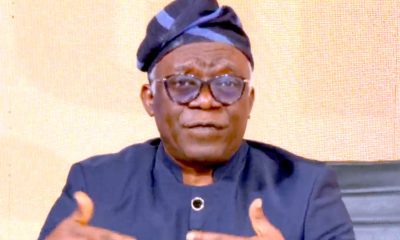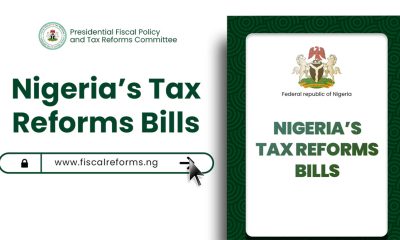Business
Despite Opposition, FG Set to Implement 5 Per Cent Hike on Data, Voice Calls
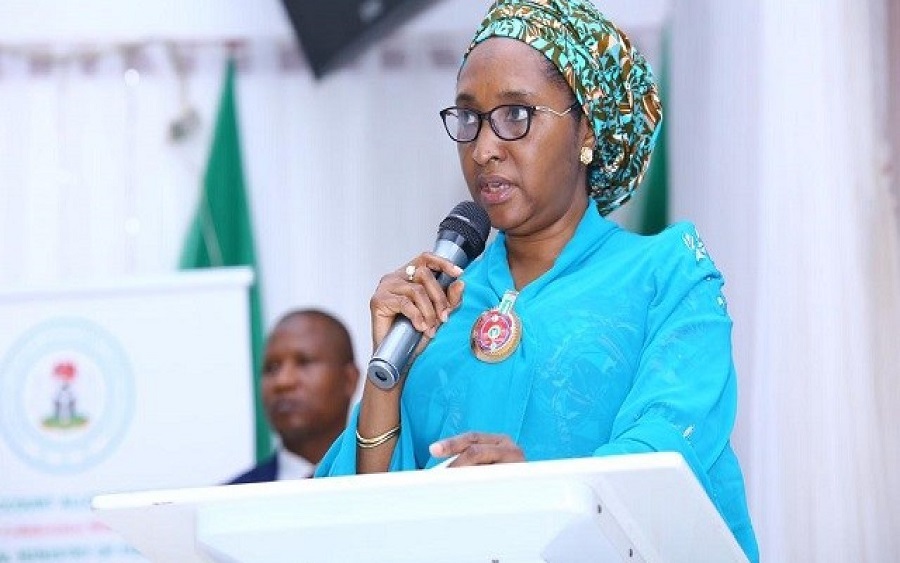
*Finance Minister faults Pantami on new tax
Despite opposition by various stakeholders, including the Minister of Communications and Digital Economy, Isa Pantami, the federal government has declared its readiness to implement the five per cent hike in tariff on data and voice calls.
Owing to this, it has directed telecommunications operators to henceforth effect the new tariff and remit to the government before the 21st of every month.
The Minister of Finance, Budget and National Planning, Mrs. Zainab Ahmed who gave the directive yesterday, also faulted her Communications and Digital Economy counterpart for claiming ignorance of the new tariff hike.
In a statement issued by her Special Adviser, Media and Communications, Yunusa Tanko Abdullahi, the finance minister announced that the government would commence the implementation of the new tax regime on all voice calls, short message services (SMSs) and data services, in addition to the existing 7.5 per cent Value Added Tax (VAT) paid for goods and services across all sectors of the economy.
The statement said the minister made the disclosure on the five per cent excise duty during a stakeholders’ meeting, organised by the Nigerian Communications Commission (NCC), the telecoms industry regulator.
It pointed out that at the meeting, Ahmed, who was represented by the Assistant Director, Tax Policy, Federal Ministry of Finance, Budget and National Planning, Musa Umar, noted: “The five per cent excise duty has been in the Finance Act 2020, but has never been implemented.
“Henceforth, the five per cent excise duty will be collected by telecom operators and payment made to the federal government on a monthly basis, on or before 21st of every month.”
READ ALSO:
- Wike sues Atiku, Tambuwal, demands recognition as candidate
- Actor Olaiya Igwe prostrates for MC Oluomo for car gift
- MURIC knocks Makinde over denial of plan to return schools to missionaries
Reacting to Pantami’s recent position that he was not carried along on the new tariff regime, Ahmed said her counterpart could not claim ignorance of the policy.
She said it was worth noting that there was a circular indicating the planned hike, which was addressed to the communication minister and other relevant ministries and agencies of government via a circular referenced No. F. 17417/VI/286 dated March 1, 2022, and titled “Approval for Implementation of the 2022 Fiscal Policy Measures and Tariff Amendments.”
The statement added: “Against the comments by Prof. Isa Ali Pantami, Honourable Minister of Communication and Digital Economy, concerning the five per cent excise duty hike on telecoms services, it is worth noting that there was a circular stating the planned hike which was addressed to the communication minister and other relevant ministries and agencies of government.
“The circular referenced No. F. 17417/VI/286 dated 1st March 2022, and titled “Approval for Implementation of the 2022 Fiscal Policy Measures and Tariff Amendments” was addressed to different Ministers, including Honourable Minister, Communications and Digital Economy and other heads of government agencies.
“The circular was addressed to The Secretary to The Government of The Federation, Attorney-General of The Federation, Ministers of Industry, Trade an Investment, Agriculture and Rural development, Mines and Steel and Development.
“Others are Ministers of Health, Aviation, Information And Culture, Budget And National Planning. Other heads of agencies copied in the circular are Accountant-General of the Federation, Comptroller-General of Customs, Governor of the Central Bank of Nigeria, Executive Chairman of the Federal Inland Revenue Service and the Director-General of the Raw Materials Research and Development Council.
“Others are the Executive Secretary of Nigerian Export Promotion Council (NEPC) and the Executive Secretary of the Nigerian Investment Promotion Commission.”
Reinforcing her position, Ahmed said with the aforementioned reference, it therefore, meant that all stakeholders had by that singular provision been aware of the Act.
According to her, the excise duty on telecommunication services provided in Nigeria introduced through the Finance Act, 2020 with statutory enactment on January 1, 2021 is yet to be implemented till date.
She added that this was considering the need to ensure reasonable transition period before the implementation of the new tax, as well as providing clarity to all stakeholders on implementation modalities.
Pantami had recently expressed dissatisfaction with efforts by the federal government to introduce the five per cent excise duty on telecommunication services.
Speaking at the maiden edition of the Nigerian Telecommunications Indigenous Content EXPO (NTICE) themed ‘Stimulating the development of Indigenous Content through innovation and commercialisation’ in Lagos, he had stressed the need for the government and stakeholders to continue to support the sector, and not unnecessarily burden.
Pantami had said he would explore every legitimate means to stop the planned five per cent excise duty on telecoms consumers, faulting the timing and process of imposing the tax on the industry.
According to him, part of the responsibility of a responsive government was not to increase the challenges that citizens were facing.
“The Minister of Communications and Digital Economy is not satisfied with any effort to introduce excise duty on Telecommunications. When VAT was increased to 7.5 per cent, I was not consulted.
” I only heard the announcement and I think there is something questionable and I am glad that we are on the same page with our National Assembly members.
“They too have not been consulted despite the fact that they are part of the committee,” the minister reportedly said.
Business
Ban on Sachet Alcohol Will Trigger Job Losses, Smuggling — NECA Warns
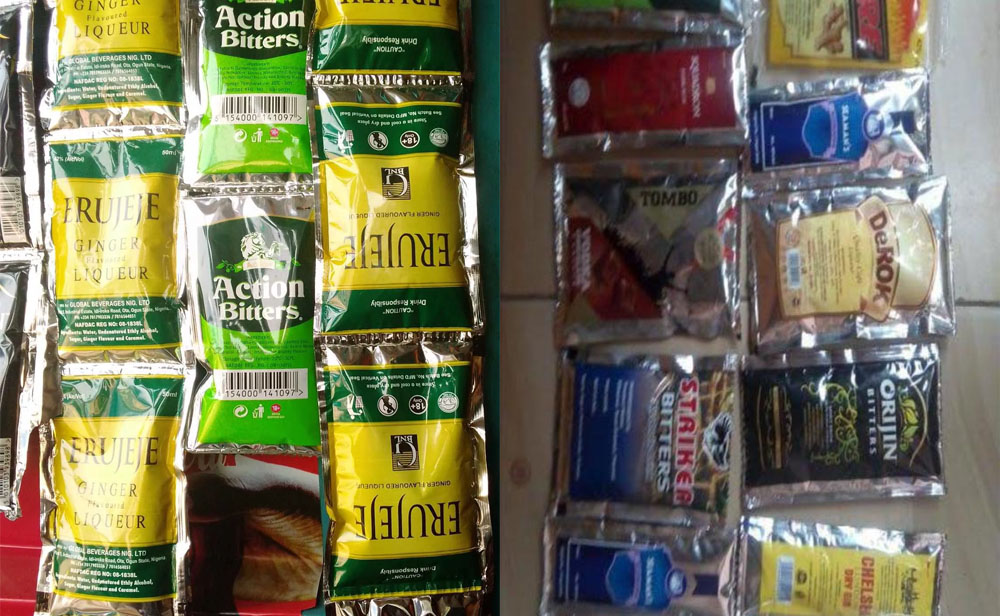
Ban on Sachet Alcohol Will Trigger Job Losses, Smuggling — NECA Warns
The Nigeria Employers’ Consultative Association (NECA) has cautioned that a blanket ban on sachet alcoholic beverages would amount to economic suicide, warning that such a policy could worsen unemployment, encourage smuggling, and overstretch already burdened security and regulatory agencies.
Speaking with journalists on the ongoing debate over alcohol regulation in Nigeria, NECA’s Director-General, Mr. Smatt-Adewale Oyerinde, said prohibiting the production or sale of sachet alcohol would fail to address the root causes of alcohol abuse, particularly among young people, while inflicting serious economic and security consequences.
Oyerinde questioned the effectiveness of prohibition in a country with porous borders and limited enforcement capacity.
“If children under 18 are consuming alcohol, whose fault is it? Is it the parents, the schools, or the producers? Alcohol is not evil; abuse is the problem. Banning one product while others remain legal will not solve it,” he said.
He disclosed that more than ₦800 billion has been invested in the alcohol and allied industries, which employ thousands of Nigerians directly and indirectly. According to him, a sudden ban would lead to massive job losses, business closures, and loan defaults, further aggravating Nigeria’s unemployment crisis.
READ ALSO:
- One Feared Dead, Five Trapped as Rice Mill Collapses in Kebbi Capital
- Peter Obi Defects to ADC, Unveils Opposition Coalition Ahead of 2027 Elections
- UNN Students Reject 100% Fee Hike, Insist on Maximum 25% Increase
“We seem unconcerned about rising unemployment and the message such policies send to investors. If someone invests a billion dollars today, what assurance do they have that a policy will not abruptly shut down their business in a few years?” Oyerinde asked.
The NECA Director-General warned that scarcity created by a ban would only drive up prices and fuel illegal trade.
“When you ban a product you cannot effectively police, you simply create a thriving market for smugglers,” he noted, adding that unregulated foreign alcohol products had already flooded the market during the recent festive season.
He also argued that banning alcohol consumption in public places would merely shift consumption elsewhere.
“If people cannot drink on the streets, they will drink at home. If not at home, then in their cars. So what exactly have we solved?” he queried.
Oyerinde stressed that agencies such as the Nigeria Police, Customs, and other regulatory bodies would be overwhelmed by the additional burden of enforcing a ban, insisting that policy decisions must consider the broader economic impact.
Rather than imposing a blanket ban, NECA called for targeted and coordinated solutions, including stronger institutions, improved regulation, and innovative enforcement strategies such as random checks and sobriety testing, as practiced in other countries.
“A blanket ban is a lazy approach. What Nigeria needs is thoughtful and dynamic policymaking that tackles abuse, protects young people, and preserves jobs without damaging the wider economy,” he said.
He added that NECA was willing to collaborate with government agencies, including NAFDAC, to develop practical and sustainable solutions to alcohol abuse in Nigeria.
Ban on Sachet Alcohol Will Trigger Job Losses, Smuggling — NECA Warns
Aviation
VAT on Aircraft, Spare Parts Threatens Survival of Nigerian Airlines, says Allen Onyema

VAT on Aircraft, Spare Parts Threatens Survival of Nigerian Airlines, says Allen Onyema
The Air Peace CEO, Allen Onyema, has warned that Nigeria’s new tax laws threaten the survival of local airlines, arguing that the legislation reinstates taxes removed under the 2020 reforms. The taxes include customs duties on imported aircraft, aircraft parts, engines, and Value Added Tax (VAT) on tickets, which Onyema says will impose unsustainable financial burdens on airlines.
Speaking in an interview with Arise News on Sunday, Onyema stressed the high cost implications for airline operators.
“There is VAT on the importation of aircraft. For an aircraft worth $80 million, you are supposed to pay 7.5 percent. With bank loan interest rates at 30–35 percent, plus VAT on spare parts, it is unsustainable,” Onyema said. “If we implement that tax reform, Nigerian airlines will go down in three months.”
The Air Peace CEO also announced that the airline industry will no longer tolerate unruly passengers starting January 1, 2026. Onyema cited instances of disruptive behaviour by passengers on flights, including smuggling alcohol into the cabin, forcing upgrades to business class without payment, and threatening fellow travellers.
READ ALSO:
- Train Derailment in Southern Mexico Kills 13, Injures Nearly 100 in Oaxaca
- Tragedy in Lekki as Lexus SUV Crashes Into Children, One Feared Dead, Four Injured
- Presidency Intervenes in Akume, Alia Political Dispute in Benue
He referenced a recent incident on a flight diverted to Manchester, UK, due to bad weather, where passengers staged a viral video accusing Air Peace of misconduct, despite British authorities confirming that over 200 flights were diverted that day.
Onyema emphasised that airlines will now enforce stricter measures, including blacklisting unruly passengers, asserting that the behaviour is currently being “supported by the system unnecessarily.”
The statement comes amid growing concerns over rising domestic airfares. On December 10, the Senate summoned the Aviation Minister, Festus Keyamo, and industry stakeholders over soaring ticket prices. Subsequently, on December 11, the House of Representatives called on the federal government to reduce aviation taxes by 50 percent to ease costs for travellers.
Onyema’s comments highlight both the financial pressures on Nigerian airlines due to aviation taxes and the sector’s new stance on passenger discipline to safeguard safety and service standards.
VAT on Aircraft, Spare Parts Threatens Survival of Nigerian Airlines, says Allen Onyema
Auto
Changan CS55, Kia Seltos take top SUV honours at 2025 NAJA Auto Awards

Changan CS55, Kia Seltos take top SUV honours at 2025 NAJA Auto Awards
Changan CS55 and Kia Seltos have clinched top honours at the 2025 Nigeria Auto Journalists Association (NAJA) International Auto Awards, winning Midsize SUV of the Year and Compact SUV of the Year, respectively.
The awards were announced at a recent well-attended ceremony held at the Oriental Hotel, Victoria Island, Lagos, which brought together key stakeholders across Nigeria’s automotive value chain to celebrate excellence, resilience and innovation in the industry.
Changan CS55’s latest recognition comes after its impressive performance at last year’s 17th edition of the awards, where it was crowned Nigeria’s New Car of the Year.
At the 2025 ceremony, the compact crossover SUV edged out strong contenders such as the Kia Sonet and Chery Tiggo to secure the coveted Midsize SUV title.
Changan vehicles are marketed and assembled in Nigeria by Mikano Motors, reinforcing the growing impact of local assembly in the country’s automotive sector.
In the Compact SUV category, the Kia Seltos emerged winner, beating notable competitors such as the Toyota Prado, Changan CS55 and Chery Tiggo.
READ ALSO:
- Ojuelegba Bridge Gridlock as Container Truck Overturns in Surulere, Lagos
- Troops Foil Kidnapping on Otukpo–Enugu Expressway, Rescue Passengers in Benue
- Davido Joins Accord Party, Aligns With Uncle, Osun Governor Ademola Adeleke
Industry analysts have described the Seltos as a compelling blend of practicality and style, praising its bold design, versatility and appeal to modern drivers.
Other corporate winners at the event are the Mikano Group, which was named Auto Company of the Year; Iron Products Industries (IPI) Limited, honoured as Truck Assembler/Body Builder of the Year; Lanre Shittu Motors (JAC), awarded Truck Plant of the Year; and Innoson Vehicle Manufacturing (IVM), which won Passenger Car Assembly Plant of the Year.
These recognitions highlighted the depth and growing strength of indigenous participation in Nigeria’s automotive industry.
Speaking at the ceremony, the Director-General of the National Automotive Design and Development Council (NADDC), Otunba Joseph Osanipin, commended NAJA for sustaining a credible platform promoting excellence and accountability within the sector.
In his welcome address, NAJA Chairman Mr Theodore Opara described the awards as a benchmark for performance in Nigeria’s evolving automotive ecosystem, noting that the industry continues to adapt amid policy reforms, technological advancements and changing consumer expectations.
The 2025 NAJA International Auto Awards once again underscored the critical role of leading brands in strengthening Nigeria’s transportation and industrial backbone, while celebrating outstanding achievements across the nation’s automotive landscape.
Changan CS55, Kia Seltos take top SUV honours at 2025 NAJA Auto Awards
-

 metro2 days ago
metro2 days agoNiger Delta Crackdown: Army Seizes ₦150m Stolen Oil, Arrests 19 Suspects
-

 Sports3 days ago
Sports3 days agoCristiano Ronaldo Wins Best Middle East Player at 2025 Globe Soccer Awards in Dubai
-

 Sports3 days ago
Sports3 days agoAnthony Joshua injured as two die in fatal Lagos-Ibadan Expressway crash (plus photos)
-
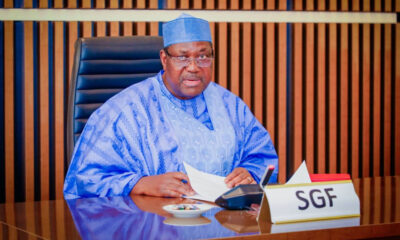
 metro1 day ago
metro1 day agoMrs. Regina Akume Urges SGF George Akume to Return to Christianity Amid New Marriage
-

 metro2 days ago
metro2 days agoTwo Close Aides of Anthony Joshua Identified as Victims of Fatal Crash
-

 metro2 days ago
metro2 days agoOgun Man Arrested After ₦4,000 Debt Dispute Claims Stepbrother’s Life
-
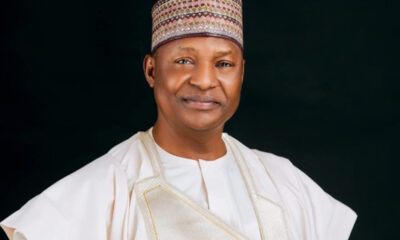
 metro1 day ago
metro1 day agoMalami, Son, Wife Remanded Over ₦Billions Money Laundering Charges
-

 metro2 days ago
metro2 days agoTinubu Condoles Anthony Joshua After Ogun Crash That Killed Two Associates









